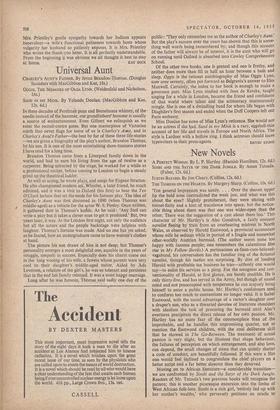Universal Aunt
IN these decades of Perelman puns and Bemelmans whimsy, of the needle instead of the hammer, our grandfathers' humour is usually a source of embarrassment. Even Gilbert we relinquish as we enter the recruit-centre gates. But one masterpiece of Victorian mirth that never flags for some of us is Charley's Aunt, and in Charley's Aunt's Father—the best by far of these three life-stories —we are given a biography of the play's author, Brandon Thomas, by his son. It is one of the most entertaining show-business stories I have read for a long time.
Brandon Thomas came from a Liverpool family down in the world, and had to earn his living from the age of twelve as a carpenter. Being attracted by the stage, he worked for a while as a professional reciter, before coming to London to begin a steady grind up the theatrical ladder.
As well as acting, he wrote plays, and songs for Eugene Stratton. He also championed modern art. Whistler, a later friend, he much admired, and it was a visit to Oxford (his first) to hear the Ten O'Clock lecture that set the seeds for his famous play. The idea of Charley's Aunt was first discussed in 1890 (when Thomas was middle-aged) as a vehicle for the actor W. S. Penley. Once written, it gathered dust in Thomas's harlds. As he said : 'Any fool can write a play but it takes a clever man to get it produced.' But, two years later, it was. At the London first night, not only the audience but all the actors and the people backstage were helpless with laughter. Thomas's fortune was made. And no one has yet asked, as he feared, how an undergraduate came to have women's clothes at hand.
The picture his son draws of him is not deep; but Thomas's personality emerges a most delightful one, equable in the years of struggle, unspoilt in success. Especially does his charm come out in the long wooing of his wife, a Jewess whose parents were very cool to their daughter's middle-aged suitor. Aided by Ada Leverson, a relation of the girl's, he was so tolerant and persistent that in the end her family relented. It was a most happy marriage. Long after he was famous, Thomas said sadly one day of the
public : 'They only remember me as the author of Charley's Aunt.' But the play's success over the years has shown that this is some- thing well worth being remembered by; and though this account of the father will always be of interest, it is the aunt who will go on running until Oxford is absorbed into Cowley Comprehensive School.
Of the other two books, one is genteel and one is frothy, and neither does more than fill in half an hour between a bath and sleep. Oggie is the reticent autobiography of Miss Oggie Lynn, now over seventy, often put forward as Belgravia's answer to Elsa Maxwell. Certainly, the index to her book is enough to make a governess purr. Miss Lynn studied with Jean de Reszke, taught singing for a while in London, became the friend and confidante of that world where talent and the aristocracy murmurously mingle. She is one of a dwindling band for whom life began with Diaghilev's first season and ended when the Duff Coopers left our Paris embassy.
Miss Donlan has none of Miss Lynn's reticence. She would not be an actress if she had. Sand in my Mink is a racy, eggshell-thin account of her life and travels in Europe and North Africa. The style is Lardner with a hollow ring. I think actresses should leave










































 Previous page
Previous page